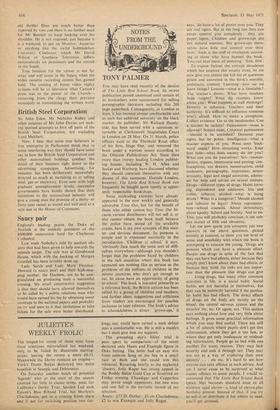NOTES FROM THE. UNDERGROUND
art
TONY PALMER
You may have read recently of the demise of The Little Red School Book. Its recent publication passed unnoticed until certain of its booksellers were summonsed for selling pornographic literature including this 208 page paperback. Consequently, in London at least, it has become almost unobtainable and as such has achieved notoriety on the black market. Its publisher, Mr Richard Handy- side, has been served with a summons re- turnable at Clerkenwell Magistrates Court in London on 28 May. On 31 March, police officers went to the Theobald Road office of his firm, Stage One, and removed the book under a warrant issued according to the Obscene Publications Act. Since then more than twenty leading London publish- ing houses, including W. H. Allen and Seeker and Warburg, have discussed whether they should associate themselves with any dissent of this summons. Outside London, however, The Little Red &drool Book can frequently be bought quite openly at appar- ently respectable bookshops.
Some misleading excerpts' have already appeared in the now weekly and generally admirable Time Out, but for the benefit of those who either cannot buy Time Out be- cause various distributors will not sell it, or else cannot obtain the book itself because the police have seized all the available copies. here is my own synopsis of this sinis- ter and devious document. Its purpose is simple and is expressed succinctly in the introduction. 'Children at school,' it says, 'obviously face much the same sort of diffi- culties everywhere—although you shouldn't forget that the problems faced by children in the rich countries where this book has appeared are nothing like as serious as the problems of the millions of children in the poorer countries who don't get enough to eat, let alone have an opportunity of going to school.' The book is intended primarily as a reference book; the British edition has been edited by a group of children and teachers, and further ideas, suggestions and criticisms from readers are encouraged for possible inclusion in later editions. The book's advice to schoolchildren is direct : 'grown-ups,' it
says, `do have a lot of power over you. They are real tigers. But in the long run they can never control you completely : they are paper tigers. Children and grown-ups are not natural enemies. But grown-ups them- selves have little real control over their lives.' Such is, the stuff of revolution, accord- ing to those who have banned the book.
You can hear them all shouting : filth'.
To expose loaner the corrupt decadence which has inspired this smutty trash, let me
now give you almost the full list of questions posed and answered in the book's sensible, undidactic content. Learning—how uo we learn things? Lessons—what is a timetable? The teacner's duties. What have teachers been taught? What do teachers knoiv about you? What happens at staff meetings? Honesty is influence. Teachers and their authority. It's difficult to influence someone who's afraid. How to make a complaint. Collect evidence. Go to the neadmaster. Can a teacher be sacked? l'unisnment—wnat is allowed? School meg. Corporal punishment —should it be aoolished? Demand your rights but be polite. Intelfigence—what a teacner expects of you. Wnat does 'back- ward' mean? How streaming works. Your free time—what does society do for you? What can you do yourselves? Sex—mastur- bation, orgasm, intercourse and petting; con- traceptives, wet dreams, menstruation, child molesters, pornography, impotence, homo- sexuality, legal and illegal amnions, addres- ses for help and advice on sexual matters. Drugs—different types of drugs. Habit form- ing, dependence and addiction. Tea and coffee, tobacco, alcohol—what is being drunk? What is a hangover? Should alcohol and tobacco be legal? About representa- tion—school councils. About democracy; about apathy. School and Society. And so on. This, you will probably conclude, is the sub- ject matter of filth and obscenity.
Let me now quote you complete just two answers to the above questions, picked entirely at random, to show you the level of sense and sensibility with which the book is attempting to educate the young. 'Drugs are poisons which can have a pleasant effect. People use drugs in spite of the fact that they can have bad effects, either becauSe they simply don't know about these bad effects, or because they think the risks are less impor- tant than the pleasure that drugs can give
. Using drugs, like many other common activities in life, is a social habit. Social habits are not harmful in themselves, but they can be indirectly harmful if the particu- lar habit has bad effects. The direct effects of drugs on the body are mostly on the blood, the central nervous system and the muscles' etc, etc. Or again, sex. 'This section says nothing about love and very little abbot feelings. It gives some practical information which you may find useful. There are still a lot of schools where pupils don't get this information, where they get it too late, or where they get only inadequate or mislead- ing information. People go to bed with one another for many reasons. They may lack security and seek it through sex. They may use sex as a way of exploring their own identity' . . . etc etc. It's hard to see how anyone can take offence at such advice. And yet I never cease to be surprised at what causes offence to some people. 1 would re- commend that The Little Red School Book (price 30p) becomes standard issue to all children aged eleven—a kind of eleven-plus birthday present. Instead of that, if you try to sell, it or distribute it for others to read, you'll get arrested.






































 Previous page
Previous page